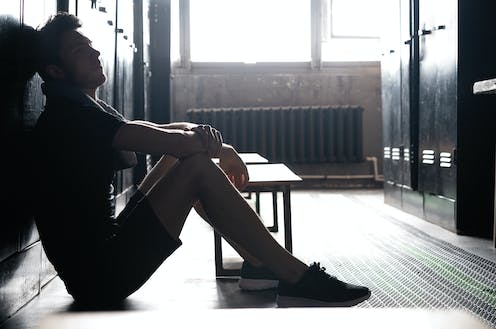
For men and boys, caring about sport typically conjures images of passionate competition and fighting for the win. This understanding of care leaves little room for self-care, health and safety, and emotional vulnerability — topics that are fraught with risks for boys and men in a sport culture of hypermasculinity.
The National Hockey League Players’ Association recently released its First Line Program to support player mental health. It signals that men’s hockey is finally acknowledging the long-known fact that “a hockey player struggling with mental health would have done so in silence.”
Flames Head Coach Ryan Huska recently told the Calgary Herald that talking openly about mental health is “kind of becoming the norm now, that people aren’t afraid to voice it.” Corey Hirsch, a retired goaltender recently told CBC News, “the game itself wasn’t the issue, the issue is the stigma of having to be a tough man.”
Similarly, in a recent interview on the Diary of a CEO podcast France and Arsenal soccer legend, Thierry Henry, spoke of the depression he suffered throughout his career:
“I’m a human being. I have feelings. Throughout my career and since I was born, I must have been in depression. Did I know it? No. did I do something about it? Obviously not, but I adapted.”
What we are seeing, then, is an overdue shift towards normalizing men and male athletes seeking help and gradually speaking more openly and vulnerably about mental health.
Table of Contents
A culture of silence
There are severe problems with the culture of masculinity in men’s sport — one that means men and boys must adapt rather than seek help and tough it out rather than take a step back. This culture of silence and bullying means men and boys have been reluctant to speak up and speak out about safety and sexual assaults. It has created an environment where men and boys feel pressured to be silent about their own mental health.
On the same podcast, Henry said:
“You’ve been told since you were young, whether at home or in your job, ‘Don’t be that guy, don’t show that you’re vulnerable.’ If they cry, what are they going to think.”
This is a culture that sporting organizations are up against in their implementation of initiatives like the First Line Program.
We need to redefine what it means to care in men’s sport. And progress has been made. In addition to the NHLPA’s First Line Program, in September 2023 Hockey Canada hosted the Beyond the Boards Summit. This was an attempt to address “toxic masculinity” while simultaneously struggling to understand it.
Then, in October 2023, Hockey Canada issued a Dressing Room Policy to “enhance inclusion and safety” and “minimize occurrences of maltreatment, bullying, and harassment.”
While this is a sign of progress, there remains some reluctance to name issues such as sexual assault and homophobia when they occur.
On World Mental Health Day 2023, Norwich City Football Club launched a campaign, #youarenotalone prompting us all to check in on those around us.
Initiatives such as these speak to a form of caring masculinity that is vital if men’s sport is to be the space of support and mental health that it can be.
A complex relationship
At times, novel ideas are borne in times of crisis; only now are we starting to make sense of the socio-cultural impacts of the COVID-19 pandemic. The complex relationship between sport and boys’ mental health became apparent when sport facilities closed for social distancing measures, negatively impacting their social, mental and emotional health.
One boy from our study described his struggles during the pandemic: “I just kind of felt sad… not being able to go rock-climbing.” In a similar vein, Juventus coach Massimiliano Allegri spoke in October 2023 about how many of his players — including young academy players — were suffering with depression in the wake of the COVID-19 pandemic.
But this disruption has also forced boys to engage with their emotions. One boy told us: “I became way more in touch with myself and my emotions.” The same sentiment is echoed by Henry, who said of the pandemic:
“Something like that had to happen for me to understand vulnerability, empathy, and crying. Understand that anger and jealousy are normal… I was crying every day for no reason… it was weird, in a good way.”
What does this tell us about sport and mental health? Primarily that sport in its traditional guise does not provide space for men’s and boys’ vulnerability and mental health.
Cultivating care in men’s sport
We can reimagine sport to be inclusive, diverse and safe, in order to tap into the positive potential of sports. But it requires redefining what it means to care. This does not mean discarding the importance of sporting competition, but rather recognizing and developing the potential for self-care and mutual support in men’s sport.
In our research with male athletes, we found that creating diverse sporting spaces facilitated open and vulnerable conversations, and promoted a culture of care and support that was important to these athletes.
These attempts at inclusion and diversity were not without their pains. The traditional culture of men’s sports sometimes reared its head making some men — particularly queer men — feel excluded, marginalized and unsafe. But the creation of spaces of emotional vulnerability and support nevertheless showed what is possible if the power of sport is harnessed and reimagined in novel ways.
![]()
Michael Kehler receives funding from the Social Sciences and Humanities Research Council of Canada.
Gabriel Knott-Fayle does not work for, consult, own shares in or receive funding from any company or organisation that would benefit from this article, and has disclosed no relevant affiliations beyond their academic appointment.





























